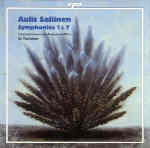Finnish composer Aulis Sallinen’s reputation rests on his operas, particularly the first two (The Red Line and The Horseman) which, together with Kokkonen’s The Last Temptations, at one stroke put the Finnish National Opera on the world musical map and also offered composers a fruitful territory to explore–one that had not already been covered by Sibelius. Sallinen’s orchestral music, on the other hand, is something of a mixed bag. The notes to this excellent new release point out that his embrace of tonality in the 1970s was a radical step for a composer in his position, but it’s not surprising given that his music largely disdains traditional counterpoint and lives on coloristic and (above all) harmonic effects.
The string passage in A Solemn Overture that immediately follows eruptive brass fanfares quite clearly reveals how much mileage Sallinen is able to get out of simple major and minor chords. However, while this style of writing is excellent as a means of creating atmosphere in the theatre, it runs a risk of sounding static when taken on its own. This same Solemn Overture, the most recent work on the disc, shows a certain want of momentum despite its skillful deployment of tunes and resourceful orchestration for standard orchestra, with no exotic “extras” in winds, brass, or percussion. It’s very listenable, for sure, and quite attractive, but I find it difficult to shake the notion that as with so much film and stage music, it consists largely of atmospheric accompaniment to something else.
Fortunately, none of the other works here elicits any doubts. Symphony No. 1 evolves organically from the tiny motive played by winds and glockenspiel at the very opening in a sort of free rondo form that lasts barely 14 minutes. Chorali does much the same, and the title further emphasizes the importance of harmony, the simple contrast between consonance and dissonance, in the composer’s mature style. Symphony No. 7, subtitled “The Dreams of Gandalf”, arose out of music intended for a ballet based on The Lord of the Rings. Perhaps because the music was intended for the dance, it’s the most energetic and impulsive piece on the disc, full of captivating tunes cloaked in absolutely magical orchestration (Sallinen is particularly adept in his use of tuned percussion). It would be a hit at any concert and at 25 minutes it’s not a moment too long.
The performances under Ari Rasilainen have the imprimatur of the composer himself, and they equal or surpass previous recordings of this music in Symphony No. 1 and Chorali. Rasilainen knocks a couple of minutes off of Okku Kamu’s timing in the former (BIS), and it’s all to the good. The Staatsphilharmonie Rheinland-Pfalz, not always the most reliable of the German radio orchestras, plays very well too, and as with all of these CPO productions the engineering is top-notch.
As the first in a projected series of Sallinen orchestral works, this couldn’t be more promising. In particular, I look forward to the chance to hear all of the symphonies with these forces. Despite the occasional reservation, Sallinen is a potent force in contemporary music and a composer with an entirely personal style. He deserves the attention.
































